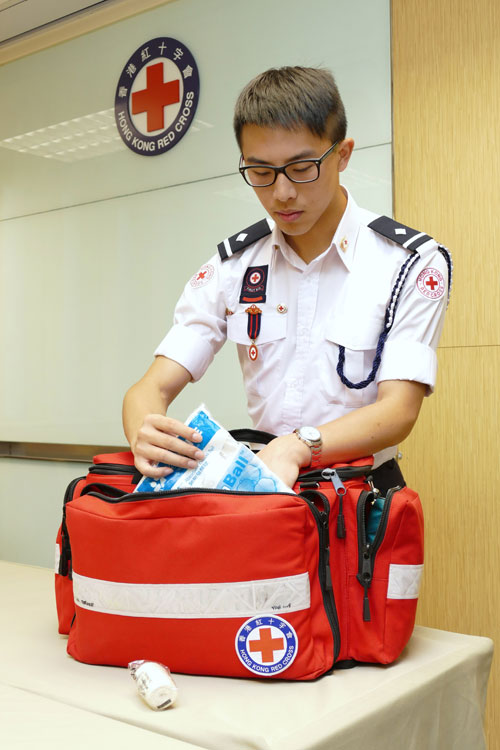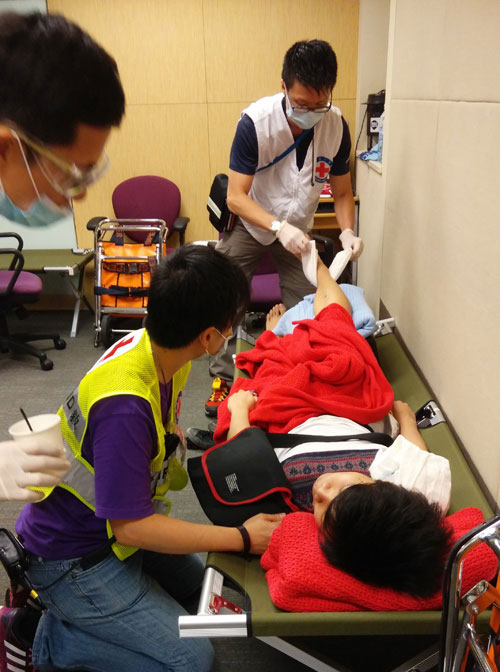
Giving psychological support at the right time can truly minimize the negative impact in the long run.
The Hong Kong Red Cross has launched the "Psychological Support Service" since 2004, to put in practice our mission of "care for the health of the vulnerable". Over the past decade, we have been training up volunteers for the Psychological Support Service, and are ready to provide timely service for those affected in emergencies. The service can be a one-to-one basis or in group, through psycho-education sessions or hotline, or as outreaching support. Simon Tang, a First Aid instructor for more than 20 years, took it as a self-challenge to gain new knowledge. He joined the Red Cross Psychological First Aid training in 2012. Since then, he has been volunteering in our Psychological Support Service.
We thank so much for your trust to HKRC and our humanitarian services. We would like to appeal for your support in sustaining and expanding our humanitarian endeavors. Your donation of HK$500 can help us train up more volunteers who can offer immediate Psychological First Aid in emergencies. Through active listening in a compassionate manner, and provision of psychological and practical assistance, our volunteers can help those traumatized in crises to stabilize their emotions and enhance their sense of security.

Rico participates in First Aid service for many years and has never imagined himself would be in need of psychological support.

Please allow me to share a service experience of Simon which happened last year, in which he has never thought of serving a First Aider with psychological support.
The Hong Kong Red Cross provided First Aid and Psychological Support Service in the Red Cross Headquarters throughout the massive social movement in Admiralty last year. In the evening of the last service day while service teams were packing up and ready for dismissal, a policeman was reported collapsed nearby. Once informed, our First Aiders rushed out to help. They applied cardio-pulmonary resuscitation (CPR) on the policeman before the ambulance crew came. After the incident, the First Aid team leader noticed some unusual responses amongst one of his teammates. He therefore sought immediate assistance from the Psychological Support Team which was also stationed in the Headquarters at the time. On duty in the Psychological Support Team were Simon and two other members.
"We first talked with the whole First Aid team about the rescue and we noticed that two of them were extraordinarily quiet in the group sharing. We hence proceeded to individual one-on-one conversation with the two," Simon recalled.
Rico was one of the First Aiders emotionally disturbed by the circumstances. "During the group sharing, my brain just went blank. Not a single word ever got into my mind," he said.
Only in the individual session could Rico manage to figure out his emotions and recollected what had happened when talking to Simon, our volunteer of Psychological Service Team. "When the First Aid team arrived, the patient had no signs of breathing, no heartbeat. The teammates thus applied cardio-pulmonary resuscitation on him and supplied him with oxygen. It was dead silent. The atmosphere was tense. The whole process was in fact only about five minutes before the ambulance arrived. We just followed usual resuscitation procedures. Everything seemed fine at the moment. It was only on our way walking back to the Headquarters that I recalled the incident and felt shocked."
Rico, a tertiary student, has joined the Red Cross uniformed group since his secondary school days. He has served as First Aider in many community activities such as sports gala, but has seldom come across critical incidents. In his great shock, this is the first encounter with patient in such a critical condition. "When we transferred the patient to the ambulance, he was still unconscious. I felt very uneasy, especially when thinking about his family and friends. I felt sorry for them."
Thanks to the immediate "First Aid" provided by the Psychological Support Team volunteers, Rico managed to accept the reality that all First Aiders had already made all-out efforts to help, with subsequent developments out of their control, Rico had his emotions calmed considerably.
"I did not know much about Psychological First Aid in the past but would occasionally come across with the Psychological First Aiders on my First Aid duty post. Now, I have gained much deeper understanding of their service and I can really say that "Psychological" First Aid is as important as "Physical" First Aid and in fact complementary to each other."
Simon also learnt that not only emergency victims can be emotionally affected, those offering help to others in crisis could also be affected by the circumstances and need psychological support. "Now my friends know that I am a trained Psychological Support Team volunteer, they would come to me for heart-to-heart talk whenever being bothered by something," he joked.
Would you share your compassion to the people in need of psychological support by making a donation to sustain our "Psychological Support Service"?
We hope to receive your gift, in hope to raise HK$3 million in total to support providing "Psychological Support Service" for the Hong Kong public being affected by local or overseas disasters or crises, as well as our other humanitarian works. Timely psychological support can help alleviate the initial distress sprouted by traumatic incidents, and foster the affected with an adaptive and coping function to better handle the incident.

Simon was one of the volunteers of psychological first aid team helping those distressed in the social movement last year. During the service, he experienced in person the importance of psychological health and is determined to continue serving.
Simon has been participating in drills and services of the Psychological Support Team since completion of related training. In the recent social movement, he has also taken part, for the first time, in our Psychological Support Hotline. "Over the phone, we can only rely on the caller's voice, tone and content to understand his/her needs and conditions." Simon usually worked with other volunteers in previous drills or services but the hotline service was very different. It is a one-to-one basis. Though it had professional backup by the onsite Clinical Psychologists, he was all on his own in the initial contact with the callers. He recalled that during his hotline duty, he would sit next to the phone and wait passively. Once the phone rang, he would tense up, and proceed cautiously to gain the caller's trust, lest he would lose the connection or opportunity to provide timely help.
"Physical First Aid is more technical and the effect or consequence can be easily seen. For instance, you would learn how many seconds you have to press on a wound to stop it from bleeding. In contrast, the application of Psychological First Aid could vary from recipients, environment and timing. On-site and real time observations and responses are crucial. Thus, our own psychological well-being is also very important." Simon analyzed.
After a traumatic incident, one may feel pessimistic or helpless, become passive, lost sense of security or self-control of the environment. The body, emotion, cognition and behavior may display stress reactions such as insomnia, headache, despair, anger, confusion, loss in concentration, social isolation, getting aversive or dumbfounded. The signs of distress vary from person to person, and will change with time and environment.

Psychological Support Service Hotline in operation during massive emergencies.
"Humans are fragile. There were callers feeling worried and distressed merely because they live near the social movement scene. An old lady called in tears at the onset of the incident, saying that she felt bad and could not sleep at all, feeling the world is unsafe and insecure to trust others." Timely psychological first aid proves to be important.
Everyone in the society ought to maintain their psychological well-being. Yet, it is inevitable for one to fall into distress in unexpected incidents. A helping hand of trained personnel would help victims to alleviate distress and cope with pressure, as well as avoid them suffering from emotional deterioration or screwing into a dead end.
Psychological Support Service is as important as Physical First Aid. It manages wounds that are invisible but need to attend to without delay. Your gift of HK$500 will enable us to train more psychological first aid and other first aid volunteers, like Simon and Rico, to contribute their acquired skills to serve people in need in the community. Please make a gift to support our "Psychological Support Service" as well as other humanitarian and community services of the Red Cross.
Besides training up volunteers to provide physical and psychological First Aid, the Hong Kong Red Cross also strives to popularize first aid through courses and activities to the public. We hope that everyone can learn First Aid, to achieve the objective of protecting lives and preventing accidents. We have different First Aid courses for members of the public, including people who need the skills at work (such as in schools or institutions), organizations or companies that offer occupational safety and health training for their staff. Moreover, we also provide tailor-made First Aid training for people with disabilities.

Ling Kwok needs hearing aid also suffers from visual disturbance due to cataract. This limits her visibility and making her easy to fall.
Ling suffers from hearing impairment. Though she failed in a First Aid course in childhood, she has never forgotten what she had learnt. When her daughter suffered from a head injury in an accident, Ling applied her First Aid knowledge to stop her from bleeding, observe her conditions before rushing her to hospital. When Ling knew about the Hong Kong Red Cross's First Aid course for the hearing impaired, she immediately enrolled without hesitation, hoping to accomplish her unfinished childhood endeavor.
"Some say a signboard falls onto the street would have a high chance to hit on a university student. But I would say it's easier to hit on someone who do not know First Aid," Ling said. She had come across someone who felt dizzy on the street. At that time, she did not know how to help and just comfort her. She therefore believes that learning First Aid can enable her to help others anytime anywhere.
There are a total of 12 students in Ling's class. It covers the full content of Standard First Aid Certificate course, such as cardio-pulmonary resuscitation, bleeding management, fracture treatment, etc. "Even just on bandaging, there are already different ways depending on the type of injuries and which part of the body is wounded. It takes practices for memorizing." Ling is working hard in her studies, aspiring to pass the exam for obtaining her First Aid Certificate.

Visually impaired Ling Kwok wishes to fulfill her childhood dream of attaining a First Aid Certificate.
"People with visual or hearing impairment may face more challenges in daily life than others, and may be easier to get injured. So I encourage people to take First Aid course. You never know when you can apply what you learnt to help your family members, your friends, or anyone around you."
While we cannot predict accidents, we can always be prepared for it. If more people have learnt First Aid, they can offer timely assistance to the sick or injured and more lives can be protected or saved in cases of emergencies. Please click here to donate online or download the donation form. Your donation of HK$500, HK$800 or even HK$1,000 can enable more people in need, such as the hearing impaired, the elderly, or other vulnerable groups, to learn First Aid for self-help and helping others. Please donate to support our "First Aid Training" and other humanitarian services of the Hong Kong Red Cross.
We sincerely hope that you would respond immediately with a gift to us. Your donation can help those in need to receive timely services, including Psychological Support Service and First Aid Training mentioned in this letter, as well as the many other humanitarian and community services of the Hong Kong Red Cross aiming for protecting lives and preventing accidents.
Lastly, we express our deepest gratitude to your support. If you have any enquiries related to our services, please feel free to feedback to us at secretarygeneral@redcross.org.hk or at 2802 0016.
Best wishes,

Bonnie So
Secretary General


